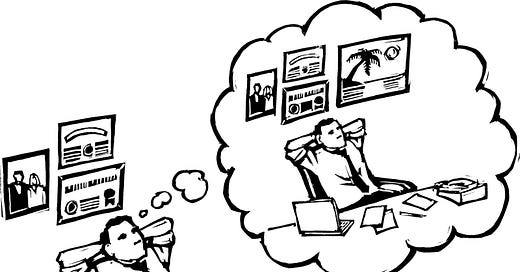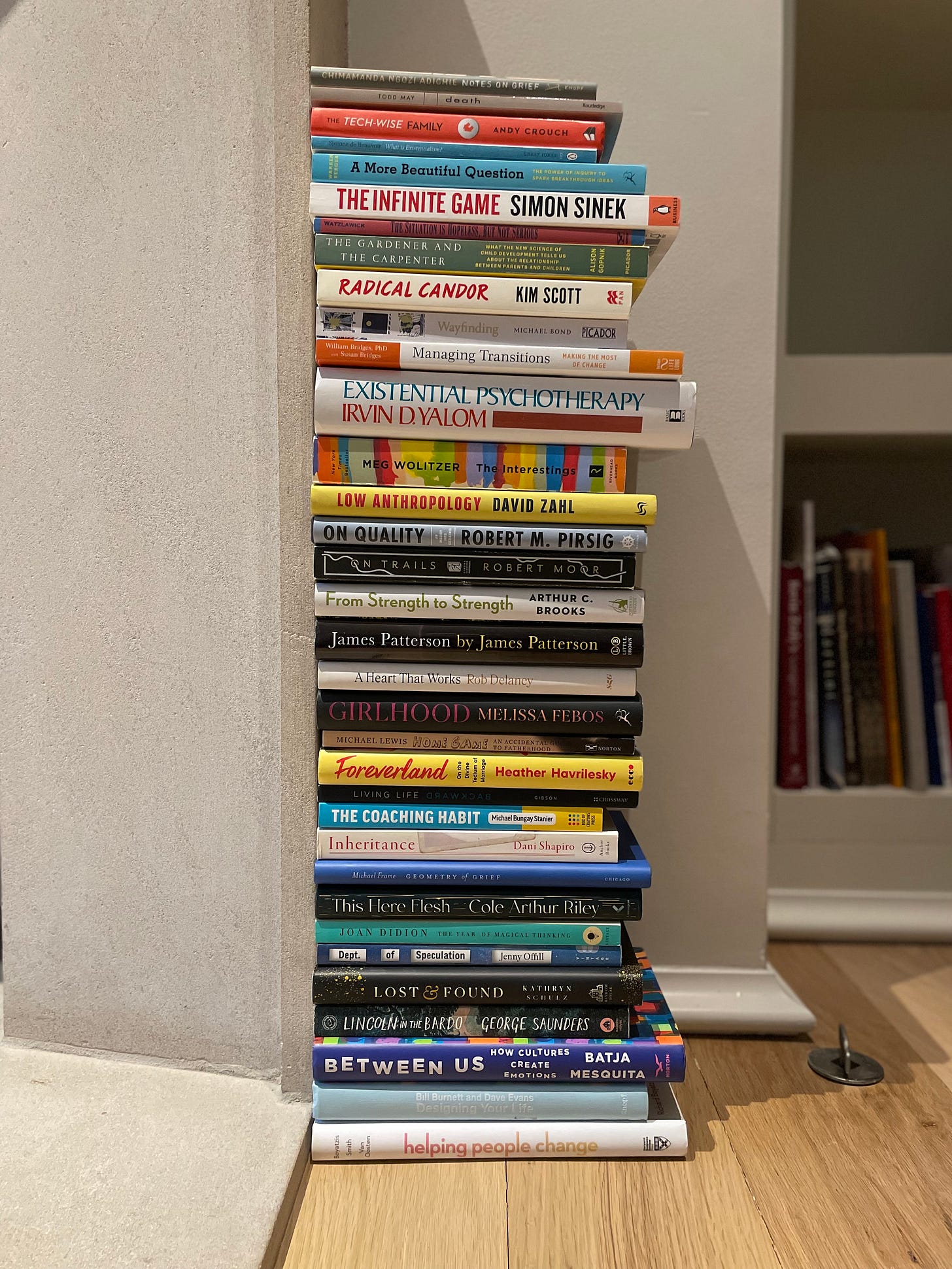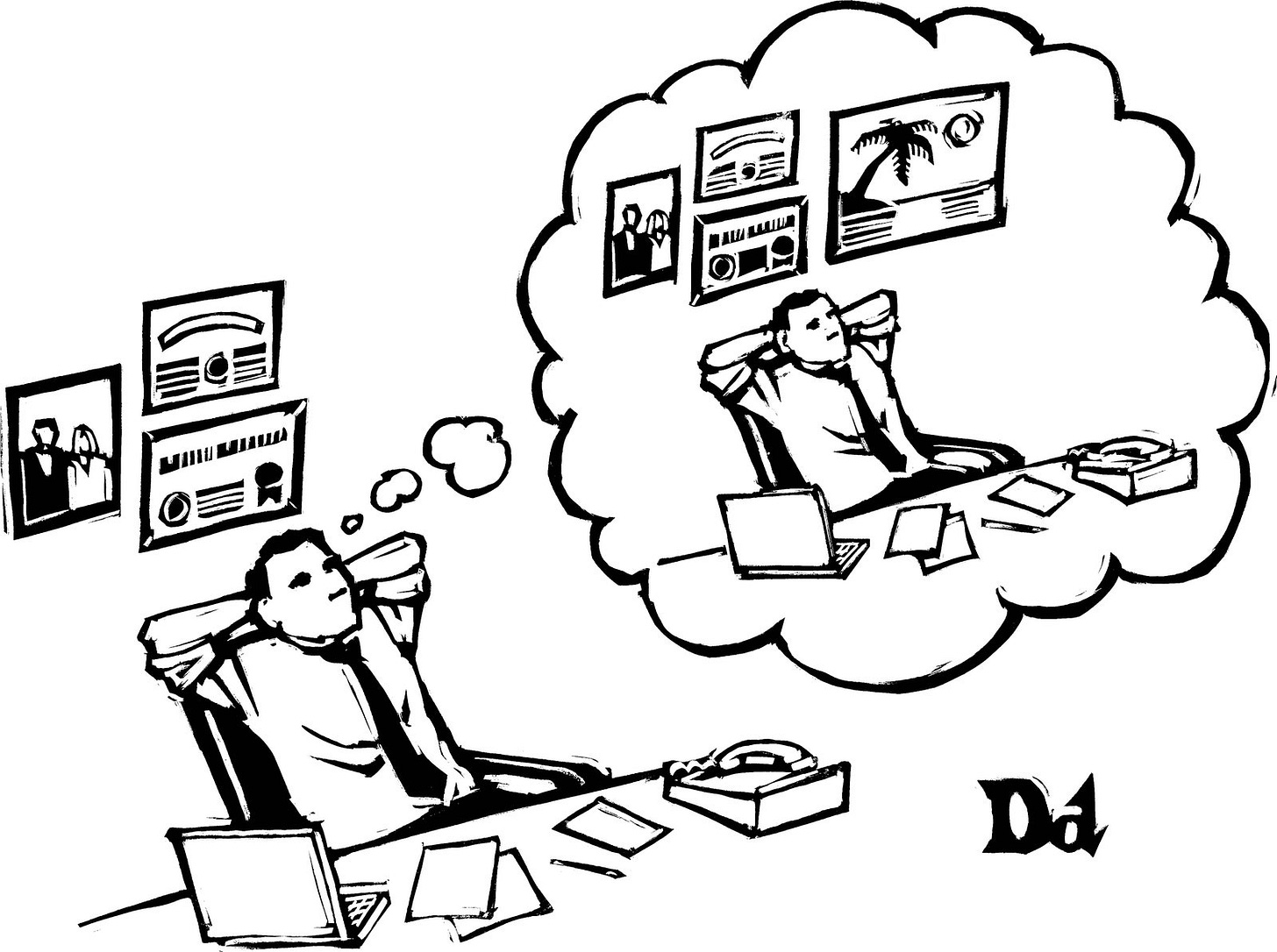Toward the end of December I posted a photo of the stack of books I read in 2022.
I started stacking books up like this in 2017 after I finished grad school. I guess I had a lot more time to read for pleasure, and I liked seeing the stack in my closet because it helped me remember more of what I’d read, gave me a visual cue of progress, and helped motivate me to keep reading.
Now the photo at the end of the year serves as a sort of mile post, something to look back on and remember what I was reading when. It also makes for some fun conversation.
After I posted the photo on instagram this year, a friend messaged me and said I should write about it. I asked him what the angle would be, but as soon as I asked I realized I knew what I had to write about - grief.
These are the books I read last year that are either explicitly or implicitly about grief in some way:
Notes on Grief by Chimamanda Ngozi Adichie
Geometry of Grief by Michael Frame
What is Existentialism? by Simone de Beauvoir
The Situation is Hopeless, but Not Serious by Paul Watzlawick
Managing Transitions by William Bridges
Existential Psychotherapy by Irvin D. Yalom
Living Life Backward: How Ecclesiastes Teaches Us to Live in Light of the End by David Gibson
Death by Todd May
From Strength to Strength by Arthur C. Brooks
Inheritance by Dani Shapiro
The Year of Magical Thinking by Joan Didion
Lost & Found by Kathryn Schulz
Lincoln in the Bardo by George Saunders
A Heart That Works by Rob Delaney
Just writing this list down feels a bit odd and overwhelming.
A thought emerges, “Huh. I guess I’m grieving something. Somethings?”
Grief is a tricky emotion. We tend to associate it only with death, and so I think we compartmentalize it to the “loss of a loved one” category in our brains. But it’s perfectly relevant for any number of other life experiences that involve, or are inflected by, loss. Moving, aging, changing jobs, to name but a few.
Indeed we can grieve in anticipation of loss, or perhaps even in the recognition that something good or beautiful will not last.
I recently listened to Emily St. John Mandel’s interview with Ezra Klein where she spoke about her latest novel Sea of Tranquility (First book of 2023! Worth the read. Yes, also implicitly about grief.), and they get on the subject of anticipatory grief. She says:
[…] do you ever have the feeling of grieving the present moment, where you know, you’ll be in a great conversation, or you’re sitting with your friend who you’re not going to see again for several weeks, or it’s just one of those magical evenings where the lighting is great, and everybody’s wonderful, and there’s music playing, and you feel like you’re sort of floating? And that moment of sadness when you realize that it’s going to be gone and you’re going to miss it — I feel that all the time. And I don’t mean to suggest a sad life or anything like that. But yeah, that’s very present for me.
I think middle age brings all this to the fore. A perfect storm of experienced and anticipatory grief. You’ve lived long enough to have sustained serious loss, and you either have realized, or soon will, that “middle-aged” is less of a sociocultural term and more of a mathematical one.
I think this is also why grief emerges in work in middle age.
We have made choices in our work, and it is in middle age that the consequences of our choices begin to truly emerge, and to settle in. Some things have materialized, some haven’t. Change becomes harder, or at least more intimidating.
It’s a time of learning to let go of the versions of ourselves we once thought we might bring into fruition, but some reason may not be able to after all.
Or, perhaps, a time of learning to surrender the version of ourselves we have brought into fruition in favor of who we might still become.
I once had the opportunity to take a version of the Thematic Apperception Test. The TAT is a projective psychological evaluation in which the test taker describes what they think is happening in ambiguous photographs (think Rorschach, but old photos not inkblots). The descriptions are then scored against rubrics to measure certain kinds of traits. The one that was administered to me was coded to measure implicit motives.
The results suggested I scored high across the board. Great I thought, highly motivated. But after debriefing the class, the professor turned to me and said, “You know what we call people who score high across the board? Confused.”
Oof. I think everyone in my life can confirm I’ve always had more interests than I knew what to do with. My friends in high school called the back of my car “the trunk of forgotten dreams” because of all the hobby flotsam rattling around back there.
Professionally, that has played out for me as an abiding sense of doubt about whether I’m doing The Right Thing. And I encounter that same feeling in so many of the people I talk to about their work.
I’ve come to believe that just beneath the hope that The Right Thing is out there is a lurking sense of grief, a recognition that making decisions involves loss; of abandoned interests that can still draw attention, of alternative paths that just. might. have. been. it., of the versions of ourselves we have neglected by choice or by circumstance.
But is there a best alternative?
I’m not sure there is. And I’m not sure the goal is to find the best one. It’s more about about learning to use the imperfect information you have, in the time you have, to make a hard choice. To invest your agency into something. Or somethings. To carry along a few interests that sustain your attention, knowing that others will wither and that perhaps the best thing to do when that happens is not to panic, but to grieve.
Apply this thinking:
Do you have an idea/goal/ambition that you’ve been hanging on to, that takes up your energy and attention, that might actually be best served by letting it go and grieving its loss?
A way of thinking about this - imagine this idea/goal/ambition is like a boat tied up tight on to dock; then imagine untying it, pushing it out, and just letting it float away from you.
What does letting it go feel like? What would you lose? What could you gain?
p.s. Thank you for reading this thing! Especially while I figure out what exactly it is. I’ve got some changes coming, including publishing more regularly this year. I’d love to hear what you think of my new schedule. And if you know anyone who would benefit from these newsletters, especially mid-career professionals who question their career path after having made a long-term investment of time, energy, and education in that path, please forward this email to them or encourage them to sign up here: https://careercommons.substack.com








in a culture that makes 'work' our primary social identity, grief has a new application: career change. I never properly grieved my academic career and it affected my next one for years. Our society needs to develop better ritual processes for 'abandoning old dreams.'